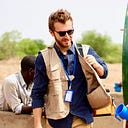Stopping the spread of violent extremism in the Sahel through basic services
Pour accéder la version française, cliquez ici.
We are at a critical moment in preventing the spread of violent extremism in Burkina Faso and in West Africa. As military solutions and peace-building programming become increasingly the focus of Western involvement in the region, we cannot and must not forget the importance that basic service provision and critical infrastructure play in counteracting the drivers of radicalization.
Over the past year, Burkina Faso has seen a staggering increase in the number and geographic spread of violent attacks, an increase of 200% over the year prior [1]. In decades past, however, Burkina has been a stronghold of stability in the region. This changed in 2014 with the popular uprising that ousted Blaise Compaoré, the then President of 27 years. Since then, a number of transnational terrorist organizations have set up shop [2]. Beginning in the country’s Sahel region, these groups have quickly spread elsewhere. In 2018, these groups opened a new theater of militant insurgency, the country’s Est region, in the space of 6 months [3]. As a direct result, I had to make the decision to evacuate Initiative: Eau’s expatriate team members from our West Africa Regional Office in Fada N’Gourma, capital of the Est region, due to the threat of kidnapping, in December 2018. We are one of the last American NGOs to maintain a presence in the Est.
Having lived in Fada N’Gourma for two years, I was called to share my perspectives on the deterioration of the security situation in the Est during a recent roundtable about security and peace in the country organized by the U.S. Ambassador to Burkina Faso Andrew Young. During the discussion, I highlighted that the country’s current “hot zones” are also its “forgotten zones”: the Sahel and the Est. In these regions, the Burkinabè state’s capacity to render basic services, such as access to healthcare and safe water, is limited and critical infrastructure, such as roads, is absent or in disrepair. The Est and Sahel regions feature two of the largest populations without access to potable water according to the Ministry of Water and Sanitation in 2017, for example [4]. Per the security risk map published by the French Ministry of Foreign Affairs for Burkina Faso, the eastern red zone, signifying formal counsel against travel, begins where the improved section of National Route 4, the principle artery traversing the Est, ends [5]. While the decision to place this red zone’s limit at this place was made by an individual and thus is not likely to be a complete coincidence, it highlights the important link that exists between critical infrastructure and security.
In these regions, many Burkinabè feel that the state has abandoned them. According to my local colleagues, these people feel as though they have been overlooked in national development plans, creating a vulnerability that recruiting terror groups have exploited. These groups offer these people an access to social, economic, and political opportunities, like food, water, and medical services, that the state has not. These groups offer inhabitants of these forgotten zones an outlet to express their discontentment, a way for them to fight for their piece of the pie.
Thus far, the stance of decision makers has been to focus on strengthening the Burkinabè military apparatus, as was the focus of the major Flintlock exercise organized the U.S. Army in Burkina in February [6], and on peace-building programming, the specific focus of the aforementioned roundtable. While both of these approaches feature crucially in how we work to prevent new radicalization, we must remember that radicalization is a symptom of larger, structural problems. While important, both military solutions and peace-building programming are symptomatic treatments that leave structural problems intact.
To really prevent further radicalization and the further spread of violent extremism, we must continue to invest in the basic services and critical infrastructure that these forgotten regions lack. We must continue to support access to healthcare and health system strengthening, access to safe drinking water, and roads. Both humanitarian and development efforts must continue to not only address the crisis situations in the Sahel and the Est, but also to prevent at-risk regions from following the same path. The global community must react. Without attention paid to these crucial structural changes, the response to the current situation in Burkina risks missing the point. And, to do so would be to miss the opportunity to control the deteriorating situation in-country, at this turning point, before it reaches the point of no return.
